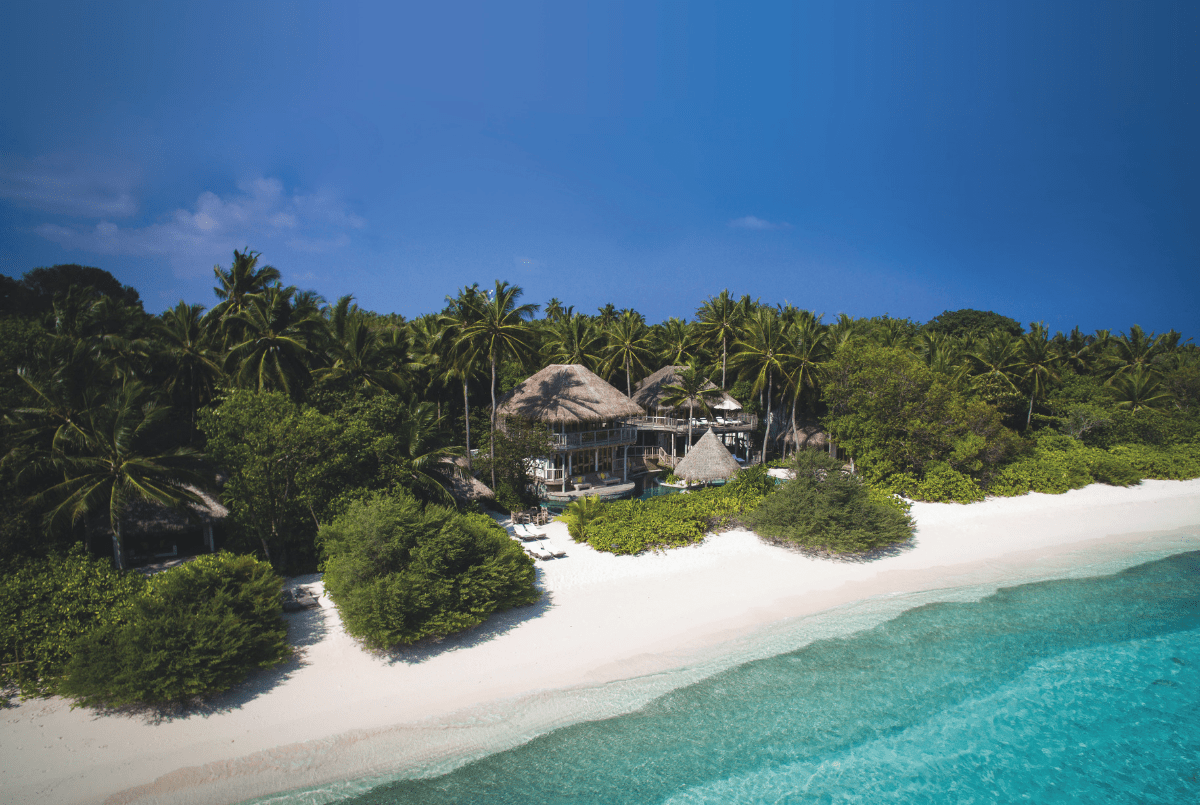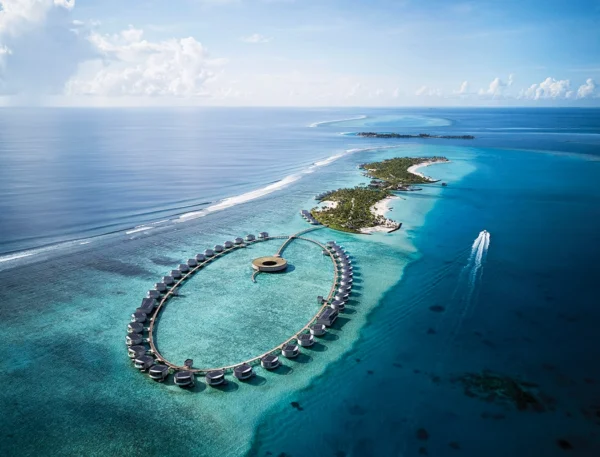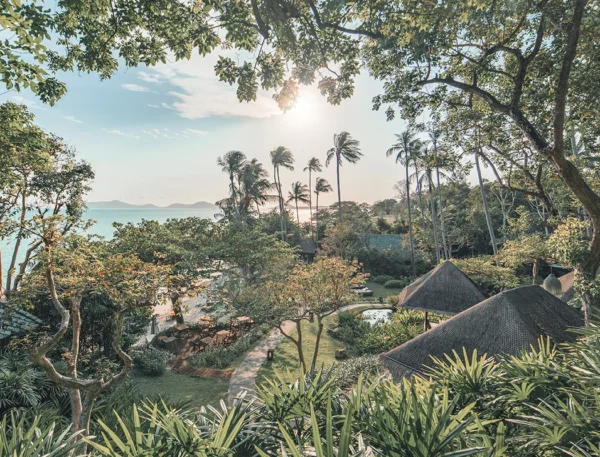Eco-awareness and luxury indulgence are no longer mutually exclusive when it comes to travel. Juliet Kinsman, founder of sustainable hotel firm Bouteco, brings us the inside track on how and where to holiday in a more planet-conscious way.
Close your eyes and picture a hotel: fluffy pillows, fancy linens, breakfast in bed, silver tea service. It’s an aphrodisiac, right? Then I drop the “s” word — sustainability. Suddenly those soft-focus scenes of romance sharpen into high-definition images of being scolded for indulging in that bubble bath when you should be camping with the most basic of creature comforts. Truth is, thanks to a new generation of getaways, you can go green and still do glamorous — just seek out stays where your hosts have social and environmental consciences. Places where bed linens are organic fairtrade cotton, ingredients served are local, seasonal and hail from independent suppliers, and the water in your tub-for-two was heated by solar energy with plant-based products that are biodegradable and ethical. And all the better if they’re free of single-use plastic, too. Ben Pundole, vice-president of Brand Experiences at Edition Hotels, has set up a wonderful initiative called Stay Plastic Free — launched at the London outpost of the Marriott-owned chain but soon to be rolled out to every Edition to make the company 100 per cent single-use plastic-free (including coffee cups, straws, toothbrushes and minibar items) by the end of 2019. “The plastic we dump on land ends up polluting some of the most remote and beautiful parts of the planet,” says Cyrill Gutsch, founder of environmental organisation Parley for the Oceans. “Many of these areas rely on tourism so marine plastic affects both ecosystems and economies. We need to stop the flow of plastic and work to protect these fragile places while we do.”
Plastic is the topic of the moment — and hotels kicking it to the kerb are indeed helping make a difference. But the hotels with the biggest hearts are the ones using their hospitality to be a force for good in other ways, too. They don’t prioritise profit margins over a sense of purpose and they challenge traditional models when it comes to operating their businesses — and through this they promise a boosted feel-good factor. As a potential booker, if you’re not sure whether environmentally friendly laundry practices are in place, don’t be shy about asking about their policies. If customers let on about what they care about, accommodation owners will respond to that.
Tourism accounts for one in 10 jobs globally, employing nearly 300 million people, so having a holiday that has a positive effect is a great way to do your bit. Research and reflect on whether your money is going to help a local economy or is destined to end up in an ex-pat’s offshore account. Select destinations that benefit from tourism rather than those being compromised by too much of it (hello, Venice; hi, Koh Samui). Bhutan’s Prime Minister Tshering Tobgay believes his country not to be carbon-neutral, but carbon-negative. Huge swathes of Costa Rica are UNESCO-protected, and most of its electricity is renewably sourced. Namibia was the first African country to add the protection of the environment to its constitution. Sweden and Switzerland have long been poster countries for a “reduce, reuse and recycle” way of living, while Iceland aims to be entirely fossil fuel-free by 2050.
Here are a handful of decadent yet mindful properties around the globe that are leading the way in eco-tourism.
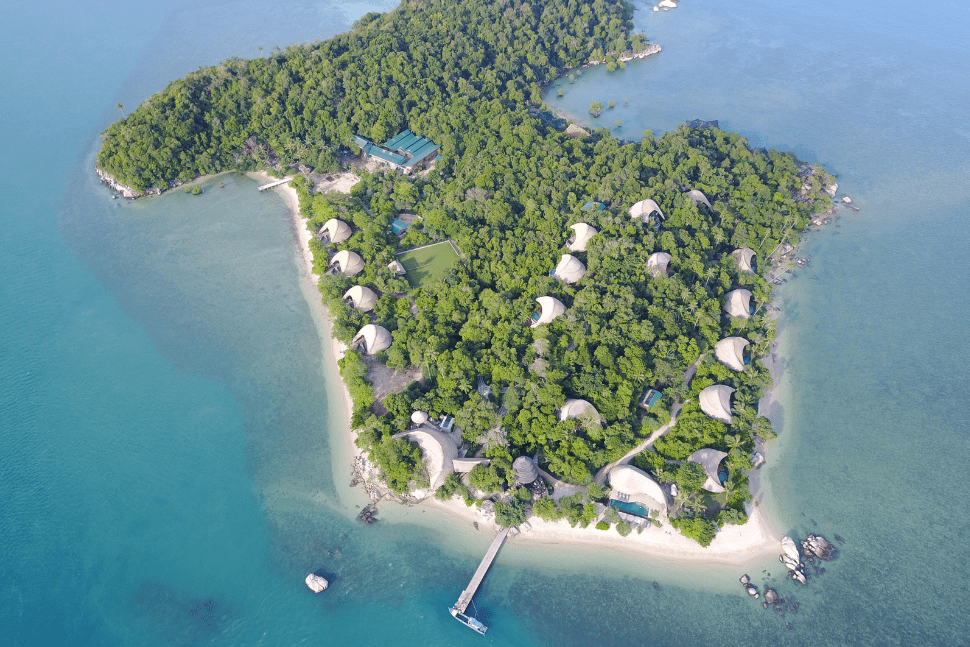 Pin
Pin Bright ideas for a brighter future: brainchild of Andrew Dixon, philanthropic creator of Nikoi — the rustic-deluxe private-island retreat in the Riau Archipelago — Cempedak is an environmentally-conscious, adults-only resort in the South China Sea. Bunk up in one of its beautifully breezy open-air bamboo villas or have a whirl in the new spa at the water’s edge and your time in paradise also pays it forward. As well as feeding you delicious authentic Indonesian feasts and fresh ingredients from its own farm on Bintan, its Island Foundation supports income, health and education through community-based projects. Share magical moments with the island’s only other inhabitants, the critically endangered pangolin, sea otters and silver-leaf monkeys and tune into nature all around as you watch the ebb and flow of the ocean from the comfort of your bed.
Prices range from £277-£374 per room per night including tax, excluding breakfast.
cempedak.com
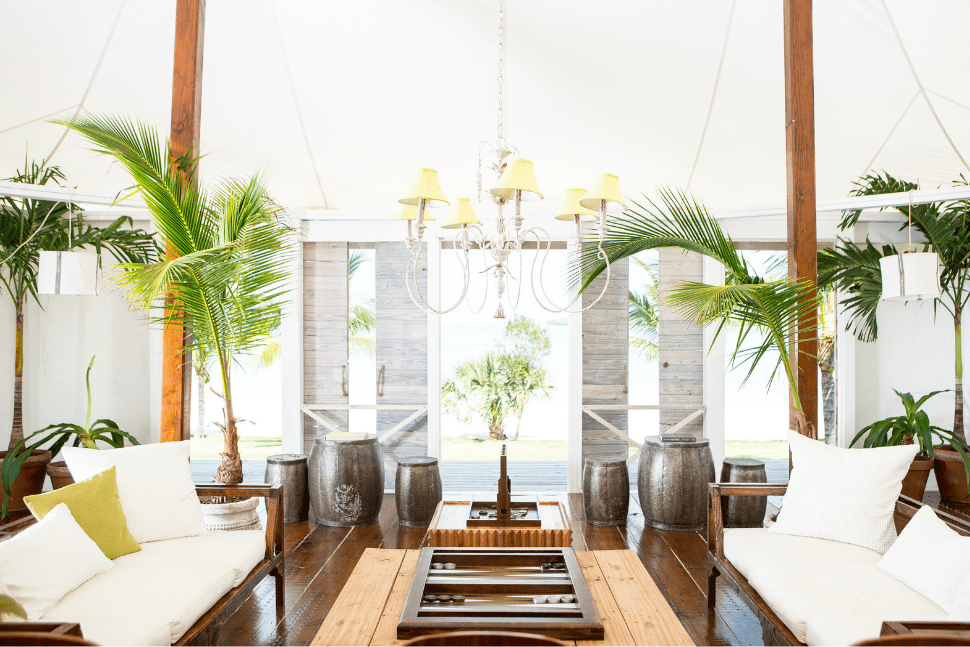 Pin
Pin The perfect antidote to the hubbub of Harbour Island (which is seven minutes away by speedboat), this self-sufficient, solar-powered Caribbean camp will have you saying sayonara to wi-fi and hello to feeling more connected in other ways. Here, sustainability and style go hand in hand and come as standard. Treading lightly on Eleuthera Island’s natural environment, its three hardwood and canvas tents and three shacks with four-poster beds are stripped back and dotted across the beachfront and the hillside. Dining is communal with everything cooked to order, so no horrid wasteful buffet situations. The Instagram-perfect pool is filled with untreated ocean water and guests are encouraged to explore the island by bike with paddle boards, snorkels and yoga mats to borrow, plus ping-pong, pool and a small outdoor gym. Healthy living has rarely felt so hedonistic.
Prices from £415-£720 per room per night, including tax and breakfast.
ontheos.com
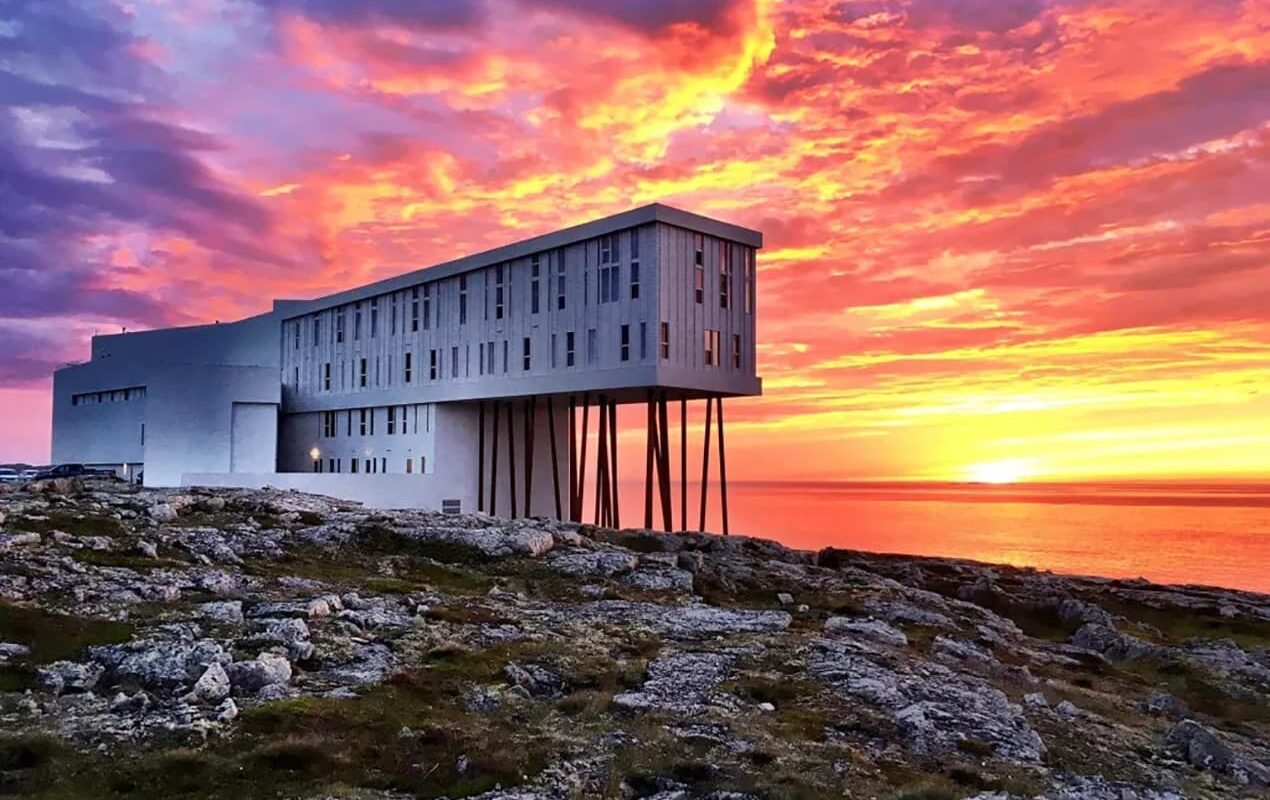 Pin
Pin 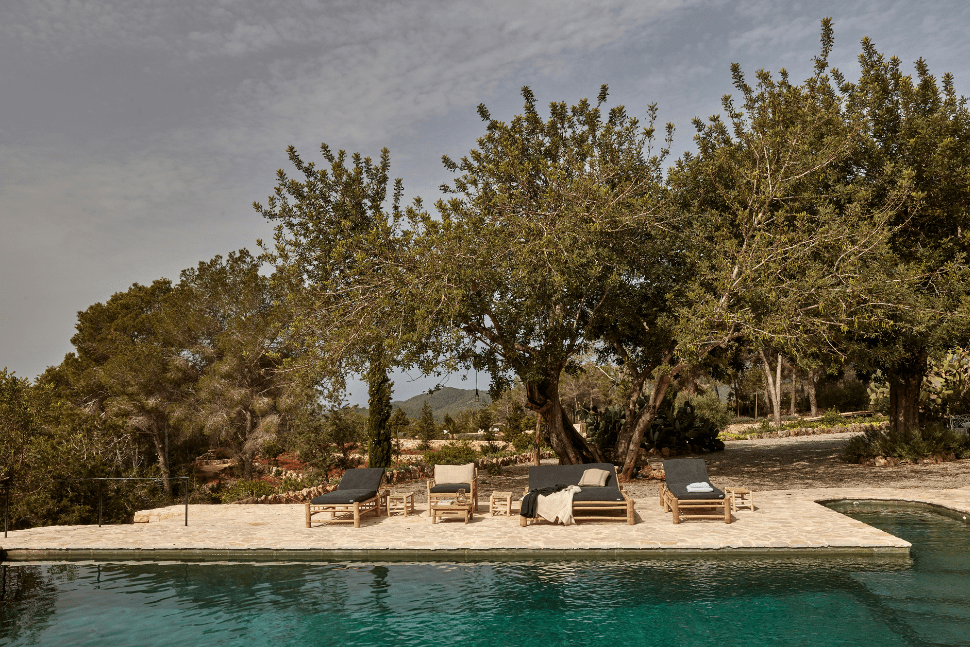 Pin
Pin An agriturismo haven for holistic relaxation tucked away in Ibiza’s green hills with a style and spirit that betrays its Design Hotels credentials. The back-to-nature finca has set new standards in authentic organic experiences, far from earshot of the island’s clubs and beach parties. A 200-year-old farmhouse reimagined by designer Armin Fischer, converted into a neutral-toned, carbon-neutral hideout that’s rich in rustic character. Alongside growing leafy radishes, picking perfectly ripe heritage tomatoes and brewing compost tea, master farmer and leading horticulturist Andy Szymanowicz encourages guests and locals to get involved in the biodynamic farming process, excitedly educating them on why to choose probiotics and permaculture over pesticides and walks you through how to best use food waste to nurture nutrient-rich soil. This rustic retreat also has a charismatic calendar of art, music and meditation events — so, yes you might also spot Ibiza’s see-and-be-seen crowd grazing on the good life here, such is its Instagram-friendly opulence and mindful nature.
La Granja is members-only: €200/£175 per season. Prices from £290-£460 per room per night, including tax and breakfast.
lagranjaibiza.com
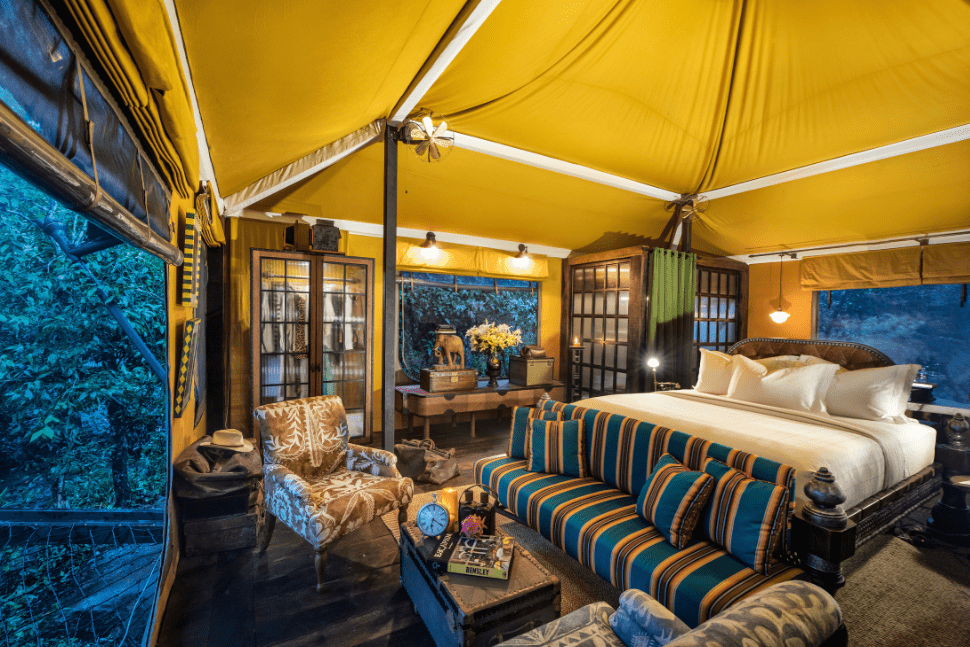 Pin
Pin Bill Bensley’s newest boutique hideaway has arrived – lightly and elegantly – in Cambodia’s south-west rainforest. No doubt you’ll soon see the acclaimed designer’s flamboyant touches at these 16 riverside tents filling Instagram feeds and travel magazines, but it’s the environmentally aware architecture and honourable hospitality model that works in partnership with Wildlife Alliance, Fauna & Flora International and the Royal University of Phnom Penh to conserve and protect these threatened wildlands. Guests will be able to join rangers and researchers as they check camera traps and study the enormity of the vibrant ecosystem in the forests. Behind the scenes it’s creating precious opportunities for this especially challenged part of Southeast Asia. To put the underprivilege into perspective, the average earnings in Cambodia are a fifth of those in Thailand and a whirl in this camp, on the border of three national parks, will enrich the life of locals through the Shinta Mani Foundation: the NGO has been enabling education, employment and healthcare in underprivileged villages around the world since 2004. It’s not just whether the hotel has an excellent spa (it does) or a glorious restaurant (it overlooks a stunning waterfall), the most exciting elements come from hosts offering interest-free loans to local entrepreneurs and distributing water filters across the country to help save newborn children otherwise at risk from unclean water.
Prices from £1900 per tent per night.
shintamani.com
by Juliet Kinsman
Pack How to Give Up Plastic by Will McCallum while you’re away — and then pass it on to someone else after you’ve read it.
Avoid plastic when packing: don’t take any to a place that might not have a responsible refuse system and always use refillable drinking-water bottles such as LifeStraw (£50).
Prioritise natural skincare products that are ethical, biodegradable and chemical-free. Try Aurelia’s Cell Repair Night Oil (£62) or Dr Jackson’s Face and Eye Essence (£60), a nourishing balm that’s ideal for jet lag. Nourish London is a vegan, London-based brand from Dr Pauline Hili: its Essential Travel Collection (£25) features cleanser, peptide serum, repair mask and firming facial oil in a cotton bag — perfect for dry, irritated skin and long-haul flights.
When it comes to sun lotion, avoid oxybenzone — a UV-filtering chemical compound found in most brands of sunscreen — which is killing coral reefs. Try Scent Free Sun Lotion SPF30, £22.50, from Green People.
Be a humanitarian on the hoof: consult packforapurpose.org and find out what will help where, from school supplies and medical equipment to footballs.
Play citizen scientist: data collection can be the most time-consuming part of conservation, so join projects such as Surfers Against Sewage by reporting on water conditions.
Don’t be glued to your phone: connect with people you meet on the way — all the better if you can learn a few words in the local language and have meaningful conversations.
Join the eco-travel movement and sign up for the Parley for the Oceans newsletter at parley.tv/engage. You can also join Parley-affiliated beach clean-ups on your travels.
Follow @BoutecoHotels on Instagram for inspiring tips for stylish and sustainable luxury hotels.
This feature was originally published in the Summer 2018 issue of The Glossary.





